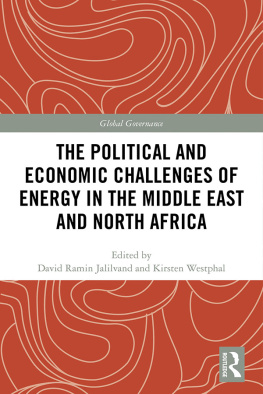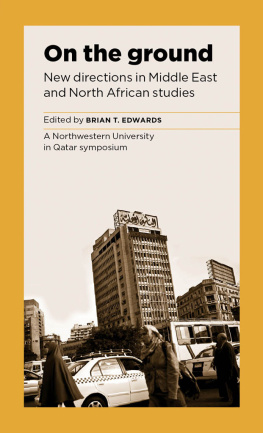The Political and Economic Challenges of Energy in the Middle East and North Africa
The Middle East and North Africa (MENA) are in disarray, and shifts in the field of energy have the potential to drastically affect the course of political and economic developments in the region. Declining oil prices, skyrocketing domestic demand, the rise of unconventional oil and natural gas production in North America, as well as shifting patterns of global energy trade all put severe pressures on both producing and importing countries in the MENA region. Policymakers are facing fundamental challenges in light of the duality of grand transformations in (geo-)politics and energy. Changes in the field of energy require substantial political and economic reforms, affecting the very fabric of sociopolitical arrangements. At the same time, the MENA regions geopolitical volatility makes any such reforms extremely risky.
Including contributions by academics and analysts from both inside and outside the MENA region, this volume explores the changes in global and regional energy, the impact of changing international energy dynamics on politics and economies in the MENA region, and the challenges that will result.
Essential reading for researchers, postgraduates, and professionals in Middle-Eastern and North African politics, global energy governance and regionalism.
David Ramin Jalilvand works with the Middle East and North Africa department of the Friedrich-Ebert-Foundation in Berlin. He holds a PhD in political science from the Free University of Berlin, examining the role of the energy sector in the political economy of Iran. David earned an MSc in Global Politics from the London School of Economics and Political Science and a BA in Government Studies from Erfurt University. During his undergraduate studies, he spent one year at the Moscow State Institute for International Relations. He specializes in energy and international politics, especially in the Middle East.
Kirsten Westphal is Senior Associate at the German Institute for Politics and Security in Berlin (SWP). In the Global Issues Division, she works on international energy relations and energy security issues. Her expertise are in Global Energy Issues and Security of Supply (Oil and Gas), Renewables, International Energy-Governance; Non-conventional Oil and Gas; EU Foreign Energy Relations with the US, Russia, Caspian Region, MENA and Emerging Powers Brazil, China, India and South Africa.
Global Governance
Series Editor: John J. Kirton
University of Toronto, Canada
Global governance is growing rapidly to meet the compounding challenges of a globalized twenty-first-century world. Many issues once dealt with largely at the local, national or regional level are now going global, in the economic, social and political security domains. In response, new and renewed intergovernmental institutions are arising and adapting, multilevel governance is expanding, and sub-national actors are playing a greater role, and create complex combinations and private partnerships to this end.
This series focuses on the new dynamics of global governance in the twenty-first century by:
Addressing the changes in the structure, operation and impact of individual intergovernmental institutions, above all their innovative responses to the growing global challenges they confront.
Exploring how they affect, are affected by and relate to non-state actors of global relevance and reach.
Examining the processes of cooperation, competition and convergence among international institutions and the many global governance gaps where global challenges such as terrorism, transnational crime and energy do not confront powerful international institutions devoted to their control.
Dealing with how global institutions govern the links among key issues such as climate change and health.
In all cases, it focuses on the central questions of how global governance institutions and processes generate the effective, legitimate, accountable results required to govern todays interconnected, complex, uncertain and crisis-ridden world.
See the webpage for a full list of titles: www.routledge.com/Global-Governance/book-series/ASHSER1420.
The Political and Economic Challenges of Energy in the Middle East and North Africa
Edited by
David Ramin Jalilvand and Kirsten Westphal
First published 2018
by Routledge
2 Park Square, Milton Park, Abingdon, Oxon OX14 4RN
and by Routledge
711 Third Avenue, New York, NY 10017
Routledge is an imprint of the Taylor & Francis Group, an informa business
2018 selection and editorial matter, David Ramin Jalilvand and Kirsten Westphal; individual chapters, the contributors
The right of David Ramin Jalilvand and Kirsten Westphal to be identified as the authors of the editorial matter, and of the authors for their individual chapters, has been asserted in accordance with sections 77 and 78 of the Copyright, Designs and Patents Act 1988.
All rights reserved. No part of this book may be reprinted or reproduced or utilized in any form or by any electronic, mechanical, or other means, now known or hereafter invented, including photocopying and recording, or in any information storage or retrieval system, without permission in writing from the publishers.
Trademark notice: Product or corporate names may be trademarks or registered trademarks, and are used only for identification and explanation without intent to infringe.
British Library Cataloguing in Publication Data
A catalogue record for this book is available from the British Library
Library of Congress Cataloging in Publication Data
Names: Jalilvand, David Ramin, editor. | Westphal, Kirsten, editor.
Title: The political and economic challenges of energy in the Middle East and North Africa / edited by David Ramin Jalilvand and Kirsten Westphal.
Description: Milton Park, Abingdon, Oxon ; New York, NY : Routledge, 2018. | Series: Global governance | Includes bibliographical references and index.
Identifiers: LCCN 2017031176| ISBN 9781138706224 (hardback) |
ISBN 9781315201917 (e-book)
Subjects: LCSH: Petroleum industry and tradeMiddle East. | Petroleum industry and tradePolitical aspectsMiddle East. | Petroleum industry and tradeAfrica, North. | Petroleum industry and tradePolitical aspectsAfrica, North.
Classification: LCC HD9576.N36 P63 2018 | DDC 338.2/728dc23
LC record available at https://lccn.loc.gov/2017031176
ISBN: 978-1-138-70622-4 (hbk)
ISBN: 978-1-315-20191-7 (ebk)
Typeset in Times New Roman
by Wearset Ltd, Boldon, Tyne and Wear
Contents
Figures
Tables
Contributors
Ayoub Abu-Dayyeh is a civil engineer and Doctor of Philosophy, and head of a chartered consultancy office for energy studies and green buildings design in Amman, Jordan. He has authored several books on energy efficiency, green buildings design, renewable energy, the downfall of nuclear power after Fukushima, etc. He is an ex-president of the Energy Conservation Society and a winner of many prizes: the Jordan State Prize for Engineering 1992, the Green Apple Award golden prize for the built environment 2010 and the Environmental Advocate award by Arab Cities Organization 2015. Currently, he is Vice-president of the Center of Strategic Energy Studies based in Amman.






